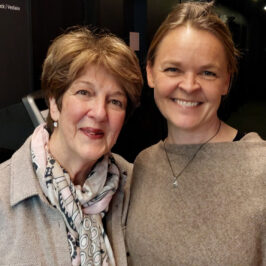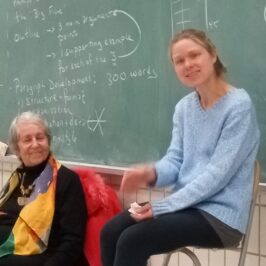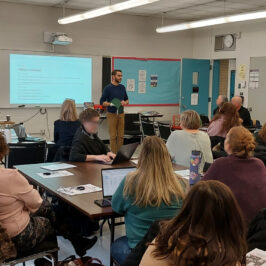This workshop was hosted live at Temple Israel and not recorded. Powerpoint and accompanying lesson plan are available.
2017 workshop “Immigration and Refugees: Then and Now. What Can We Learn?” marked 70 Years since the arrival of 1,123 Jewish Holocaust orphans to Canada. The workshop emphasized their stories and experiences. The workshop examined Canada’s policy regarding immigration and refugees during 1933 – 1945. And then looked at the changes toward refugees between 1947 – 1949 and their integration into Canada; the important role of the Jewish community welcoming them in and then continuing to support them. In particular, to understand the forceful impact of the displacement of people, and to develop empathy and compassion between individuals to educate for a better world.
Keynote address: Robbie Waisman, one of the 1123 Jewish orphans who were admitted to Canada from 1947 to 1949.
Special presentations: CBC journalist Judy Trinh, who arrived in Canada as a refugee with the Vietnamese “Boat people”, and Elin Beaumont of the Educational Outreach and Program Coordinator of the Holocaust Survivor Memoirs Program at the Azrieli Foundation.
The following teacher’s activities adapted to our specific needs for this teacher’s workshop are taken from Facing History and Ourselves online teacher’s materials. In each of our workshops we give full credit to this tremendous organization for its fantastic work and dedication to understanding the effects of racism and othering and the importance of compassion and understanding.
Below we have listed the links to each of the teaching strategies that we have used. That way, if you look through our examples and see a certain teaching strategy that would be useful in your own classrooms, you can visit the Facing History and Ourselves website and download their instructions, tools, and examples, in addition to our adapted examples.
The workshop was specifically designed for High School teachers and focused on:
- Event Program
- Contextual Information: “A Brief History of Canadian immigration”
- Contextual Information: “2017 -2018 Department Plan for Immigration, Refugees and Citizenship Canada”
- Teachers’ Workshop 2017 OCDSB Vision & Exit Outcomes
- Think – Pair – Share Strategy “Instruction for Teachers” Strategy # 1 (30 min)
- Think – Pair – Share Strategy “Instruction for Teachers” “Orphaned and Stateless”
- Think – Pair – Share Strategy “Liberation and loss”
- Think – Pair – Share Strategy “Closed Doors”
- Think – Pair – Share Strategy “Where Can We Go?”
- Think – Pair – Share Strategy “Becoming Canadian”
- Identity Charts “Instructions for teachers”
- Identity Charts “John Freund”
- Identity Charts “Saul Hayes”
- Identity Charts “Ketty Salsberg and Ellen Foster”
- Identity Charts “Greta Fischer”
- Identity Chart “William Loyed Mackenzie King”
- “Canada’s Jewish War Orphans Project” Video by fifth-grade student, Zachary Mullin, 2014
Keynote speakers included:
Robbie Waisman – One of the Holocaust orphans who will speak about his story of survival;
Judy Trinh a journalist with CBC radio will share her fascinating personal story as one of the Vietnamese Boat people;
Special presentation by Elin Beaumont Educational Outreach and Program Facilitator, Azrieli Foundation






